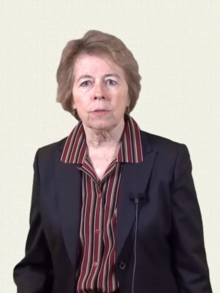Catherine Elgin: Difference between revisions
m Moving from Category:American philosophers to Category:21st-century American philosophers diff to 21st cent after adding 20th where relevant and documented using Cat-a-lot |
Shapeyness (talk | contribs) More recent image |
||
| Line 2: | Line 2: | ||
{{Infobox philosopher |
{{Infobox philosopher |
||
|name = Catherine Z. Elgin |
|name = Catherine Z. Elgin |
||
|image = Catherine Elgin |
|image = Catherine Elgin 2017.png |
||
|caption = Elgin |
|caption = Elgin in 2017 |
||
|birth_date = {{birth year|1948}} |
|birth_date = {{birth year|1948}} |
||
|birth_place = |
|birth_place = |
||
Revision as of 17:17, 29 October 2023
Catherine Z. Elgin | |
|---|---|
 Elgin in 2017 | |
| Born | 1948 |
| Alma mater | Brandeis University |
| Institutions | Harvard University |
Main interests | epistemology and the philosophies of art and science |
Catherine Z. Elgin (born 1948) is a philosopher working in epistemology and the philosophies of art and science.[1] She is currently a professor of philosophy of education at the Graduate School of Education at Harvard University.
Education and career
She holds a Ph.D. from Brandeis University where she studied with Nelson Goodman. She has held tenure-track and visiting positions at many universities, including Michigan State University, Vassar College, Princeton University, and MIT.[2] In 2023, she was elected a Fellow of the American Academy of Arts & Sciences.[3]
Philosophical work
Elgin's work has considered such questions as "what makes something cognitively valuable?" As an epistemologist, she considers the pursuit of understanding to be of higher value than the pursuit of knowledge.[1]
In Considered Judgment, Elgin argues for "a reconception that takes reflective equilibrium as the standard of rational acceptability."[4]
Bibliography
- With Reference to Reference, Hackett, 1983
- Reconceptions in Philosophy and Other Arts and Sciences, together with Nelson Goodman, Routledge, 1988
- Revisionen. Philosophie und andere Künste und Wissenschaften, 1993
- The Philosophy of Nelson Goodman, v. 1. Nominalism, Constructivism, and Relativism, ISBN 0-8153-2609-2, v. 2. Nelson Goodman's New Riddle of Induction, ISBN 0-8153-2610-6, v. 3. Nelson Goodman's Philosophy of Art, ISBN 0-8153-2611-4, v. 4. Nelson Goodman's Theory of Symbols and its Applications, ISBN 0-8153-2612-2, 1997[5]
- Between the Absolute and the Arbitrary (Paperback), Cornell University Press, 1997[6]
- Considered Judgment, Princeton University Press, 1996
- Philosophical Inquiry: Classic and Contemporary Readings, 2007
- Begging to differ, The Philosophers' Magazine, December, 2012
- True Enough, MIT Press, 2017
- "Understanding in Science and Elsewhere": Interview with Catherine Z. Elgin about her philosophy and her intellectual biography, published 2019 on 3:AM Magazine [1] and republished on 3:16 [2]
See also
References
- ^ a b "Harvard: Catherine Elgin". Harvard University. Retrieved 2009-03-01.
- ^ https://www.gse.harvard.edu/sites/default/files/faculty/documents/catherine-elgin-314.pdf
- ^ https://www.amacad.org/new-members-2023
- ^ "Considered Judgment". Princeton University Press. Retrieved 2009-03-01.
- ^ Elgin, Catherine (1997). The Philosophy of Nelson Goodman. Taylor & Francis. ISBN 0-8153-2612-2.
- ^ "Between the Absolute and the Arbitrary (Paperback)". Amazon.com. Retrieved 2009-03-02.
